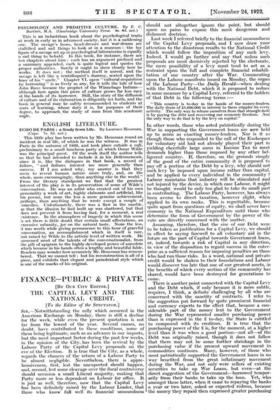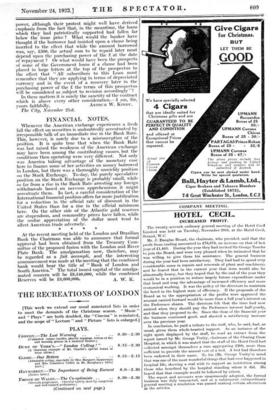FINANCE-PUBLIC & PRIVATE.
[BY OUR CITY EDITOR.]
THE CAPITAL LEVY AND THE NATIONAL CREDIT.
[To the Editor of the SPECTATOR.] SIR,—Notwithstanding the rally which occurred in the American Exchange on Monday, there is still a decline for the week, while even the present quotation is not far from the lowest of the year. Several causes, no doubt, have contributed to these conditions, 'soine of them being legitimate, such as an advance in our imports, but the most important factor during the past few weeks, in the opinion of the City, has been the revival by the Labour Party of the Capital Levy proposals on the eve of the Election. It is true that the City, as a whole, regards the chances of the return of a Labour Party to be almost negligible. Nevertheless, there is appre- hensiveness, first, lest the unexpected should happen, and, second, lest some cleavage over the fiscal controversy should occasion a small Liberal majority, making that Party more or less dependent on Labour for office. It is just as well, therefore, now that the Capital Levy has been -definitely raised by the Labour Leader, that those who know full well its financial unsoundness should not altogether ignore the point, but should spare no pains to expose this most dangerous and dishonest doctrine.
Last week I referred briefly to the, financial unsoundness of the Capital Levy proposals, and I now draw your attention to the disastrous results to the National Credit which would follow the imposition of any such levy. Indeed, I would go further and say -that unless such proposals are most decisively, rejected by the electorate, the mere possibility of a levy must tend to act as a restraint upon the full and complete financial rehabili- tation of our country after the War. Commenting upon the Labour manifesto issued on Monday, the organ of the Labour Party—the Daily Herald—when dealing with the National Debt, which it is proposed to reduce in some measure by a Capital Levy, referred to the holders of that Debt in the following terms :— " This country is to-day in the hands of the money-lenders. The daily drain of £1,000,000 in interest to them cripples its every activity. The only way to release ourselves from that strangle-hold is by paying the debt and recovering our economic freedom. And the only way to do that is by the levy on capital."
In other words, those who acted patriotically during the War in supporting the Government loans are aow held up to scorn as exacting money-lenders. Nor is it as though those who responded to the call of the Exchequer for voluntary aid had not already played their part in yielding cheerfully large sums in Income Tax to meet demands higher than those imposed by any other bel- ligerent country. If, therefore, on the grounds simply of the good of the entire community it is proposed to pay off a portion of the Debt by a levy, why should not such levy be imposed upon income rather than capital, and be applied to every individual in the community ? Labour maintains that industry will be stimulated and not injured by the device, in which case Labour, it might be thought, would be only too glad to take its small part in contributing. The Labour Party, however, has always been averse to direct taxation, however slight, when applied to its own ranks. This is regrettable, because quite apart from questions of equity, we shall never have economy in the National Expenditure until those who determine the form of Government by the power of the vote arc directly concerned with the matter. Assuming, therefore, that the size of our Debt were to be taken as justification for a Capital Levy, we should in effect be saying farewell to all voluntary aid in the future on the part of Capital towards Government loans, or, indeed, towards a risk of Capital in any direction, in view of the disposition to regard success in the enter- prise as a sufficient reason for imposing penalties on those who had run those risks. In a word, national and private credit would be shaken to their foundations and Labour would discover too late that one of our greatest assets, in the benefits of which every section of the community has shared, would have been destroyed for generations to come.
There is another point connected with the Capital Levy and the Debt which, if only because it is more subtle, requires, I think, a definite challenging by all who are concerned with the sanctity of contracts. I refer to the suggestion put forward by quite prominent financial and currency experts to the effect that, because a con- siderable part . of the money lent to the Government during the War represented smaller purchasing power than is expressed in the £ to-day, the State is entitled to compound with its creditors. It is true that the purchasing power of the £ is, for the moment, at a higher level than it was when a good portion—not all—of the Debt was originally raised, though it does not follow that there may not be some further shrinkage in the purchasing value if the present upward movement in commodities continues. Many, however, of those who most patriotically supported the Government loans in no way benefited from the great inflationary movement during the War, and not only were sellers of existing securities to take up War Loans, but even—at the direct suggestion of the Government—borrowed tempor- arily from their banks to take up the loan. Yet, who amongst these latter, when it came to repaying the banks a year or two later, asked or expected redress, because the money they repaid then expressed greater purchasing power, although their protest might well have derived emphasis from the fact that, in the meantime, the loans which they had patriotically supported had fallen far below the issue price ? What would the banker have thought if the borrower had insisted upon a clause being inserted to the effect that while the amount borrowed was, say, £500, the actual sum to be repaid later must depend upon the purchasing power of the £ at the date of repayment ? Or what would have been the prospects of some of the Government loans if a clause had been placed in large letters at the top of the prospectus to the effect that " All• subscribers to this Loan must 'remember that they-are applying in terms of depreciated currency and in the event of a recovery later in the purchasing power of the the terms of this prospectus will be considered as subject to revision accordingly " ? In these matters it is surely the sanctity of the contract which is above every other consideration.—I am, Sir,



















































 Previous page
Previous page